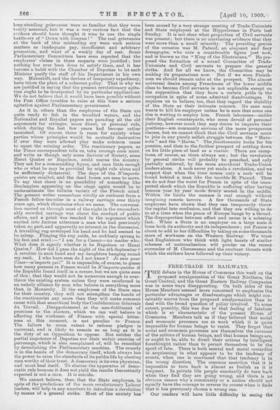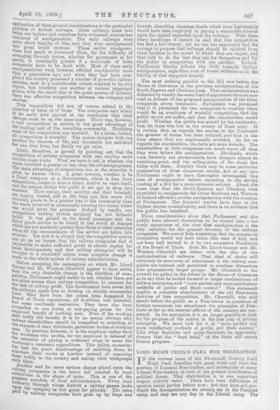FREE-TRADE IN RAILWAYS. T HE debate in the House of Commons
this week on the proposed amalgamation of the Great Northern, the Great Central, and the Great Eastern Railway Companies was in some ways disappointing. On both sides of the House Members seemed more concerned to emphasise the particular advantages or disadvantages which might con- ceivably accrue from the proposed amalgamation than to deal with the broad question of policy involved. To some extent, possibly, this was due to that feeling of fatalism which is so characteristic of the present House of Commons. Members talk as if they believed that social and economic processes are at work which it is quite impossible for human beings to resist. They forget that social and economic processes are themselves the outcome of the actions of human beings, and that human beings are, or ought to be, able to direct their actions by intelligent forethought rather than to permit themselves to be the sport of fate. There is both mental and moral cowardice in acquiescing in what appears to be the tendency of events, when one is convinced that that tendency is in the wrong direction. The common assertion that it is impossible to turn back is almost as foolish as it is frequent. In private life people constantly do turn back when they find they are going wrong, and there is no obvious reason why a community or a nation should not equally have the courage to reverse its course when it finds that it has previously chosen a wrong one.
Our readers will have little difficulty in seeing the application of these general considerations to the particular Problem of British railways. Since railways came into !-)enig our fathers and ourselves have witnessed numberless instances of amalgamation. The early railways were suite short lengths of line, and they were amalgamated lute great trunk systems. These earlier amalgama- tions had much to commend them, for the difficulty of arranging through routes, whether for passengers or for goods, is necessarily greater if a multitude of little companies have to be dealt with. Most of these early amalgamations were, however, effected considerably more than a generation ago, and when they had been coin- Pleted the country possessed a number of powerful railway Bystems, each to a considerable extent coufined to its own region, but touching one another at various important Points, with the result that at the great centres of industry there was effective competition between one company and another.
This competition did not, of course, extend to the question of rates or of fares. The companies very wisely at an early date arrived at the conclusion that their charges must be on the same scale. There was, however, a real competition in service, to the great advantage of the trading and of the travelling community. Doubtless some of the competition was wasteful. In a sense, indeed, all competition is wasteful. The acorns compete with one another for chances of life, and thousands are sacrificed for one that lives, but finally we get oaks. Little, therefore, is gained by pointing out that the Competition of railway companies with one another must Involve some waste. What we have to ask is whether the waste involved is greater or less than the advantage gained. .hie main advantage of competition lies in the stimulus it gwes to human effort. A great concern, whether it be a Trust compauy or a Government, which is free from competition, ceases to have a direct motive to exert itself, and the human beings who guide it are apt to drop into slumber. Their energy, their activity, and their foresight sre largely wasted, and in the long run this waste will certainly prove to be a greater loss to the community than the waste involved in occasionally running two trains whore °no would serve the purpose. Judged by results, our coMpetitive railway system certainly has not hitherto failed. It has gained us the finest passenger and the finest goods service to be found in the world at charges Which are not markedly greater than those of other countries when all the circumstances of the service are taken into account. Yet now it is alleged that. the competitive system Can go on no longer, that the railway companies find it Impossible to make sufficient profit to attract capital for fresh developments, and that railway enterprise will be brought to a standstill unless some complete change is made in the whole system of railway administration. Before accepting the assumption on which Mr. Lloyd George and Mr. Winston Churchill appear to have acted, that the only desirable change is the abolition of com- petition, Parliament ought surely to ask whether there are not other causes than railway competition to account for the lack of railway profit. The Government have never left tbe railways really free to develop on strictly commercial 1.,lues. They have from the outset been hampered by /60ard. of Trade regulations, all doubtless well intended, but some needlessly restrictive. They have also been compelled to run trains at non-paying prices for the supposed benefit of working men. Even if the working 171',11 really did benefit, it is by no means obvious why rallway shareholders should be compelled to subsidise, at the expense of their dividends, particular bodies of working ,11,1011. In practice, however, it is the employer rather than workman who profits, for the employer is relieved of tme uecessity of paying a sufficient wage to cover the yvorkman's necessary expenditure. This policy, moreover, has. had the grave disadvantage of enabling firms to 1.n.aintain their works in London instead of removing tir,eln bodily to the country and taking their workpeople viath them. Another and far more serious charge placed upon the radway. .companies is the heavy toll exacted by local authorities in the shape of rates. This is one of the greatest scandals of local administration. Every local rthority through whose district a railway passes looks 1)?n the company as fair game for plunder. The rates Pala by railway companies have gone up by leaps and bounds, absorbing immense funds which more legitimately' would have been employed in paying a reasonable interest upon the capital expended upon the railways. With these heavy handicaps it cannot be said. that free competition has had a fair chance ; yet no one has apparently had the courage to propose that railways should be relieved from these burdens to the extent to which they are unjust, and then told to do the best they can for themselves and for the public in competition with one another. Instead Parliament blindly follows the drift towards furthei amalgamation, regardless even of recent evidence as to the futility of that supposed remedy.
The most striking parallel to the Bill now before the House of Commons is the previous atnalgamatiou of the South-Eastern and Chatham lines. That amalgamation was defended by exactly the same kind of arguments that are now used in defence of the proposed amalgamation of the three companies above mentioned. Parliament was promised that if it permitted the two companies to combine there would be an avoidance of wasteful competition, that the public would not suffer, and that the shareholders would profit. Whether the public has gained by the amalgama- tion, let those who live in the county of Kent reply. It is certain that as regards the service to the Continent the number of trains has been reduced, and that in the busy season they are unpleasantly crowded. So far as regards the shareholders, the facts are more definite. The shareholders in both companies are much worse oil than they were before the amalgamation. Dividends, which were formerly not unreasonable, have dropped almost to vanishing-point, and the selling-price of the stock has fallen with them. Possibly there may be some particular explanation of these disastrous results, but at any rate Parliament ought to have thoroughly investigated this case of amalgamation before assenting to the second reading of a Bill for a more extensive scheme. About the same time that the South-Eastern and Chatham were permitted to amalgamate the Great Southern and Western of Ireland effected a similar amalgamation with the sanetion of Parliament. The financial results have been in the highest degree unsatisfactory, and there is no evidence that the public has benefited.
These considerations show that Parliament and the public have allowed themselves to be rushed into a too ready acceptance of the view that amalgamation is the only solution for the present troubles of the railway companies. We cannot help suspecting that the companies themselves would not have taken this view if they had. not boon half invited to it by two successive Presidents of the Board of Trade. Both Mr. Lloyd George and Mr. Winston Churchill are bitten with the idea of the nationalisation of railways. That ideal of theirs will obviously be more easy of attainment if the railway com- pauies are induced and permitted to combine themselves into progressively larger groups. Mr. Churchill so far avowed his policy in the debate in the House of Commons as to say that he looked forward to larger combinations of railway enterprise, and "more perfect and more satisfactory methods of public and State control." This statement implies a complete abandonment of the old Free-trade doctrine of free competition. Mr. Churchill, who still stands before the public as a Free-trader in questions of foreign commerce, has abandoned the principles of Free- trade so far as the internal affairs of the country are con- cerned. In his conception it is no longer possible to look for the progress of the nation in the free play of private enterprise. We must look for it in "more perfect and more satisfactory methods of public and State control." Like other Socialists and quasi-Socialists, lie apparently dreams that the "dead hand" of the State will secure human progress.







































 Previous page
Previous page